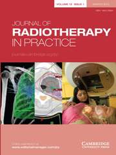
Journal of Radiotherapy in Practice
Scope & Guideline
Exploring New Frontiers in Radiotherapy Practice
Introduction
Aims and Scopes
- Innovative Techniques in Radiotherapy:
The journal emphasizes research on new and advanced techniques in radiotherapy, such as intensity-modulated radiotherapy (IMRT), volumetric-modulated arc therapy (VMAT), and stereotactic radiosurgery (SRS) to optimize treatment planning and delivery. - Clinical Outcomes and Patient Safety:
Research related to clinical outcomes of different radiotherapy techniques, safety protocols, and patient management strategies is a core focus, aimed at improving patient care and minimizing treatment-related complications. - Radiation Biology and Dosimetry:
The journal publishes studies on the biological effects of radiation, dosimetric evaluations, and advanced modeling techniques to enhance the precision of dose delivery in various treatment settings. - Patient-Centric Research:
Emphasizing the importance of patient perspectives, the journal includes studies on patient experiences, quality of life assessments, and psychosocial impacts of radiotherapy. - Technology in Radiotherapy:
The integration of new technologies, such as imaging advancements in treatment planning and delivery, and the use of artificial intelligence and machine learning in radiotherapy practices are key areas of exploration. - Brachytherapy Innovations:
Research on brachytherapy techniques and outcomes, including the development of new delivery systems and treatment protocols, is also a significant part of the journal's scope.
Trending and Emerging
- Adaptive Radiotherapy:
Adaptive radiotherapy is gaining attention, focusing on personalizing treatment plans based on real-time patient data and tumor response, enhancing treatment precision and effectiveness. - Integration of Imaging Techniques:
The use of advanced imaging modalities, such as MRI and PET-CT, for improved treatment planning and target delineation is increasingly featured, emphasizing their role in enhancing treatment outcomes. - Radiotherapy in Palliative Care:
There is a growing body of research dedicated to the role of radiotherapy in palliative care settings, focusing on symptom management and quality of life for advanced cancer patients. - Patient-Reported Outcomes and Quality of Life:
Research that incorporates patient-reported outcomes and quality of life assessments is on the rise, reflecting a broader trend towards patient-centered approaches in oncology. - Artificial Intelligence in Radiotherapy:
The application of artificial intelligence and machine learning in treatment planning, dose optimization, and quality assurance is becoming a significant theme, showcasing the integration of technology in clinical practice. - Multidisciplinary Approaches to Cancer Treatment:
Emerging research emphasizes the importance of multidisciplinary teams in managing cancer treatment, combining radiotherapy with surgery and systemic therapies for improved patient outcomes.
Declining or Waning
- Traditional Radiotherapy Techniques:
There has been a noticeable decrease in publications focused on conventional radiotherapy methods as newer, more advanced techniques such as IMRT and VMAT gain prominence. - General Radiation Therapy Audits:
While quality assurance and safety audits remain important, the specific focus on general audits without a clear application to innovative practices or patient outcomes appears to be declining. - Basic Radiation Biology Studies:
Research that does not translate into clinical applications or advanced dosimetry techniques seems to be less emphasized, as the journal shifts towards studies with direct clinical relevance. - Non-Clinical Radiotherapy Research:
Topics that primarily address non-clinical aspects of radiotherapy, such as theoretical studies without practical applications in patient care, are observed to be less frequent. - Historical Perspectives on Radiotherapy:
Papers that focus on the historical development of radiotherapy techniques or retrospective analyses without new insights or advancements have seen a decrease in publication.
Similar Journals

Physics & Imaging in Radiation Oncology
Empowering Collaboration in Physics and Imaging for Better Patient CarePhysics & Imaging in Radiation Oncology is a premier journal dedicated to advancing the interdisciplinary field of radiation oncology through innovative research and imaging technologies. Published by Elsevier, this open-access journal has made its mark since its inception in 2017, ensuring that groundbreaking findings are accessible to a broad audience. With a strong focus on the integration of physics, imaging techniques, and oncology, the journal occupies esteemed positions in the academic landscape, ranking in the top quartile for Radiation and Radiology, Nuclear Medicine and Imaging as of 2023. The journal serves as a platform for researchers, professionals, and students to share insights and foster collaboration, ultimately improving patient outcomes through enhanced imaging and treatment modalities. Based in Ireland and operating from Radarweg 29, 1043 NX Amsterdam, Netherlands, the journal aims to bridge the gap between theoretical physics and practical applications in clinical settings.

Breast Cancer-Targets and Therapy
Empowering healthcare through cutting-edge breast cancer research.Breast Cancer-Targets and Therapy is a leading journal in the field of oncology, published by DOVE MEDICAL PRESS LTD in New Zealand. Established as an Open Access journal in 2009, it offers a platform for researchers and healthcare professionals to disseminate innovative findings and therapeutic strategies related to breast cancer. With an impressive ranking in the Q2 category of oncology journals as of 2023, and placed at Rank #203/404 in the Scopus database, this journal facilitates the exchange of high-quality research aimed at improving patient outcomes and advancing clinical practices. Covering a wide array of topics from basic research to clinical trials, Breast Cancer-Targets and Therapy plays a crucial role in bridging the gap between scientific discovery and practical application. Researchers, professionals, and students alike will find the journal a valuable resource for the latest advancements and best practices in breast cancer treatment.
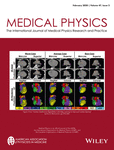
MEDICAL PHYSICS
Bridging Theory and Practice in Medical PhysicsMEDICAL PHYSICS, published by WILEY, stands as a leading journal in the fields of biophysics, medicine, and radiology, boasting an impressive impact factor and classified within the prestigious Q1 category across multiple relevant domains. With its ISSN 0094-2405 and E-ISSN 2473-4209, the journal has been a vital resource since its inception in 1974, leading the discourse well into 2024. Hailing from the United States, MEDICAL PHYSICS serves a diverse academic audience, comprising researchers, clinicians, and students eager to engage with the latest advancements and methodologies. The journal’s authoritative presence is underscored by its Scopus rankings, placing it among the top percentile in both Medicine and Biophysics, marking it as an essential scholarly platform for innovative research and critical reviews. While not currently an Open Access journal, its commitment to curating high-quality articles ensures that readers can access groundbreaking insights into medical imaging, treatment protocols, and the theoretical underpinnings of medical physics. Explore the intersection of technology and healthcare through the esteemed pages of MEDICAL PHYSICS.
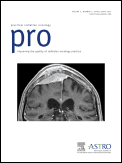
Practical Radiation Oncology
Pioneering New Paths in Patient OutcomesPractical Radiation Oncology is a premier journal published by Elsevier Science Inc., focusing on the critically important fields of Oncology and Radiology, Nuclear Medicine, and Imaging. With an ISSN of 1879-8500, this journal serves as an essential resource for professionals and researchers dedicated to advancing the practice and research of radiation oncology. Established in 2011 and continuing through 2024, it has quickly gained recognition, achieving a prestigious Q2 ranking in Oncology and an exceptional Q1 ranking in Radiology, Nuclear Medicine, and Imaging as of 2023. The journal, housed in New York, USA, provides a platform for innovative research and practical insights, aimed at enhancing therapeutic practices and improving patient outcomes. As part of its commitment to fostering scientific dialogue, it also features a range of articles, reviews, and clinical studies that cater to the diverse interests of its readers. Hard-copy availability combined with digital access ensures a broad reach for the latest advancements in the field.
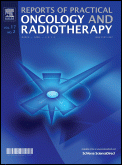
Reports of Practical Oncology and Radiotherapy
Advancing cancer care through open-access research.Reports of Practical Oncology and Radiotherapy is a distinguished open-access journal dedicated to advancing the fields of oncology, radiotherapy, and cancer research. Published by VIA MEDICA since 2001, this journal serves as a critical platform for disseminating innovative research and practical findings that impact clinical practices and patient outcomes. With an emphasis on fostering collaboration and knowledge exchange among researchers, clinicians, and students, the journal has positioned itself within the Q3 and Q4 categories of renowned directories in oncology, radiology, and nuclear medicine as of 2023. Based in Gdansk, Poland, it provides unrestricted access to its articles, ensuring that crucial research reaches a wide audience. This dedication to open access reflects the journal's commitment to transparency and innovation in the fight against cancer, making it an invaluable resource in this vital field of study.

Advances in Radiation Oncology
Elevating Standards in Cancer Care ResearchAdvances in Radiation Oncology, published by Elsevier Inc, is a premier international journal dedicated to the field of oncology and radiology, focusing on the latest groundbreaking research and innovations in radiation therapy. Launched as an Open Access journal in 2016, it has since carved out a significant niche in the academic community, featuring contributions that span a diverse range of topics including clinical practices, technologies, and outcomes in radiation oncology. With an impressive Q2 rankingOncology and Radiology, Nuclear Medicine and Imaging categories for 2023, and positioned within the 65th and 55th percentiles of Scopus ranks, it serves as an essential resource for researchers, medical professionals, and students alike. The journal not only emphasizes the importance of disseminating knowledge widely through its open access model but also aims to foster collaboration and innovation in the evolving landscape of cancer treatment. For those looking to stay at the forefront of radiotherapy research and advancements, Advances in Radiation Oncology is an invaluable platform for scholarly communication.

Journal of Radiosurgery and SBRT
Uniting Experts in the Field of RadiosurgeryJournal of Radiosurgery and SBRT is a dedicated platform for advancing the field of radiosurgery and stereotactic body radiation therapy (SBRT), published by OLD CITY PUBLISHING INC. With its ISSN 2156-4639 and E-ISSN 2156-4647, this journal serves researchers and practitioners keen on the latest findings and methodologies in the domains of radiological technology and surgical oncology. Operating from Spain, the journal has established itself within notable quartiles, ranking Q3 in 2023 across categories including Radiological and Ultrasound Technology, Radiology, Nuclear Medicine and Imaging, and Surgery. The journal is indexed in Scopus, with rankings that place it at #311 in Medicine Surgery and #232 in Medicine Radiology categories, reflecting its significance in the academic community. Although it does not currently offer an open-access model, the Journal of Radiosurgery and SBRT aims to foster innovation and collaboration, making it an essential resource for those involved in cutting-edge research and clinical practice in radiosurgery.

Journal of Contemporary Brachytherapy
Shaping the future of oncology through accessible brachytherapy research.Journal of Contemporary Brachytherapy, published by TERMEDIA PUBLISHING HOUSE LTD, is a distinguished open-access journal dedicated to advancing the field of brachytherapy within the oncology and radiology domains. Since its inception in 2009, the journal has provided a platform for researchers, clinicians, and students to share innovative findings, cutting-edge techniques, and clinical experiences, contributing significantly to evidence-based practices in cancer treatment. With an ISSN of 1689-832X and E-ISSN 2081-2841, the journal has established its presence globally, and it is indexed in Scopus, achieving a commendable standing among its peers—with rankings of #196 in Radiology, Nuclear Medicine, and Imaging and #260 in Oncology for 2023. Notably, it holds a Q3 quartile classification, reflecting its emerging influence in these critical fields. The journal is committed to open science, ensuring that research is accessible to a wide audience, which is particularly vital for the ongoing development of methodologies and the implementation of best practices in brachytherapy. Exploring topics from the technical aspects of brachytherapy procedures to patient management strategies, the Journal of Contemporary Brachytherapy is an essential resource for those looking to stay at the forefront of oncological advancements.
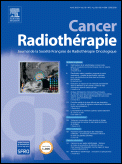
Cancer Radiotherapie
Illuminating the path to effective cancer therapies via radiotherapy advancements.Cancer Radiotherapie, published by Elsevier, is a respected academic journal dedicated to advancing the field of oncology and radiology through original research and comprehensive reviews. With an ISSN of 1278-3218 and an E-ISSN of 1769-6658, the journal serves as a vital platform for disseminating knowledge and innovation in cancer treatment methodologies, specifically focusing on radiotherapy. As of 2023, it holds a Category Quartile of Q3 in both Oncology and Radiology, Nuclear Medicine and Imaging, reflecting its significance within these domains amidst a competitive landscape. Despite its current rankings—205th out of 333 in Radiology and 269th out of 404 in Oncology—it continuously strives to build a reputable presence with contributions that push the boundaries of cancer therapy. Although open access options are not available, the journal is committed to ensuring that valuable insights reach healthcare professionals and researchers worldwide, contributing to improved patient outcomes and advancements in treatment efficacy.
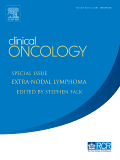
CLINICAL ONCOLOGY
Advancing Cancer Care Through Innovative ResearchClinical Oncology is a prestigious peer-reviewed journal published by Elsevier Science London, focusing on the dynamic fields of Oncology and Radiology, Nuclear Medicine, and Imaging. With an impressive impact factor reflecting its high-quality research contributions, the journal is ranked in the second quartile for oncology and the first quartile for radiology, underscoring its importance in advancing clinical knowledge and practice. Established in 1975, Clinical Oncology offers researchers, healthcare professionals, and students robust access to cutting-edge studies, reviews, and clinical trials that drive innovation and improve patient care. Based in the United Kingdom, the journal plays a vital role in disseminating significant findings, fostering collaboration, and enhancing education in the biosciences, particularly for those committed to addressing the challenges in cancer treatment and diagnostics. Given its rigorous selection criteria and broad readership, Clinical Oncology remains an essential resource for anyone dedicated to the fields of oncology and radiology.